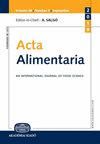Construction and functional analysis of nattokinase-producing cucumber obtained by the CRISPR-Cas9 system
IF 1
4区 农林科学
Q4 FOOD SCIENCE & TECHNOLOGY
引用次数: 0
Abstract
Nattokinase (NK) is effective in the prevention and treatment of cardiovascular disease. Cucumber is rich in nutrients with low sugar content and is safe for consumption. The aim of this study was to construct a therapeutic cucumber that can express NK, which can prevent and alleviate cardiovascular diseases by consumption. Because the Bitter fruit (Bt) gene contributes to bitter taste but has no obvious effect on the growth and development of cucumber, so the NK-producing cucumber was constructed by replacing the Bt gene with NK by using CRISPR/Cas9. The pZHY988-Cas9-sgRNA and pX6-LHA-U6-NK-T-RHA vectors were constructed and transformed into Agrobacterium tumefaciens EHA105, which was transformed into cucumber by floral dip method. The crude extract of NK-producing cucumber had significant thrombolytic activity in vitro. In addition, treatment with the crude extract significantly delayed thrombus tail appearance, and the thrombin time of mice was much longer than that of normal mice. The degrees of coagulation and blood viscosity as well as hemorheological properties improved significantly after crude extract treatment. These findings show that NK-producing cucumber can effectively alleviate thrombosis and improve blood biochemical parameters, providing a new direction for diet therapy against cardiovascular diseases.CRISPR-Cas9系统获得的产纳豆激酶黄瓜的构建及功能分析
纳豆激酶(NK)在心血管疾病的预防和治疗中是有效的。黄瓜营养丰富,含糖量低,食用安全。本研究的目的是构建一种能表达NK细胞的治疗性黄瓜,该黄瓜可以通过食用来预防和减轻心血管疾病。由于Bitter fruit(Bt)基因对黄瓜的苦味有贡献,但对黄瓜的生长发育没有明显影响,因此利用CRISPR/Cas9将Bt基因替换为NK构建了产生NK的黄瓜。构建了pZHY988-Cas9-sgRNA和pX6-LHA-U6-NK-T-RHA载体,并将其转化到根癌农杆菌EHA105中,用花浸法将其转化为黄瓜。产NK黄瓜粗提物在体外具有显著的溶栓活性。此外,用粗提取物处理显著延迟了血栓尾部的出现,并且小鼠的凝血酶时间比正常小鼠长得多。粗提物处理后,凝血程度、血液粘度以及血液流变学特性显著改善。这些发现表明,生产NK的黄瓜可以有效缓解血栓形成,改善血液生化参数,为心血管疾病的饮食治疗提供了新的方向。
本文章由计算机程序翻译,如有差异,请以英文原文为准。
求助全文
约1分钟内获得全文
求助全文
来源期刊

Acta Alimentaria
农林科学-食品科技
CiteScore
1.80
自引率
0.00%
发文量
47
审稿时长
18-36 weeks
期刊介绍:
Acta Alimentaria publishes original papers and reviews on food science (physics, physical chemistry, chemistry, analysis, biology, microbiology, enzymology, engineering, instrumentation, automation and economics of foods, food production and food technology, food quality, post-harvest treatments, food safety and nutrition).
 求助内容:
求助内容: 应助结果提醒方式:
应助结果提醒方式:


